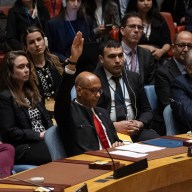By Tom Ramstack
WASHINGTON (Reuters) – U.S. civil rights leader Walter Fauntroy said he would return to Washington for the first time since he left for the Middle East in 2012 amid legal and financial troubles, the Washington Post reported on Thursday. Fauntroy, 83, who helped organize the 1963 March on Washington, told the newspaper he would return from the United Arab Emirates next week.
“I have my ticket. I have my passport. Without question, it’s over. I’m coming home,” he was quoted as saying.
Fauntroy said he had been living rent-free for the past three months in Ajman, north of Dubai, in an apartment occupied by a South Sudanese couple and their son.
He said the State Department located him and U.S. officials visited to offer him help to fly home.
The Post said that family friends had pitched in to pay for his flight to Dulles International Airport. Fauntroy asked the newspaper not to give the date of his return, fearing a crush of reporters. Fauntroy faces a bench warrant from a Maryland judge on charges of writing a $55,000 bad check to pay for a 2009 ball he organized for President Barack Obama’s inauguration.
A bank also filed in 2014 to foreclose on his house, citing outstanding payments. Fauntroy and his wife, Dorothy, 81, sought
bankruptcy protection in 2014 but the case was dismissed when he failed to get credit counseling, the Post said.
The newspaper said Fauntroy dismissed the criminal charge against him and his mounting debts as part of a conspiracy to undermine his reputation.
Fauntroy has told friends he was in the Middle East to promote peace and environmentally friendly technology and to end world hunger.
The retired Baptist pastor served from 1971 to 1991 as the District of Columbia’s first delegate in Congress in more than a century.
He also helped organize the 1965 “Bloody Sunday” protest in Selma, Alabama, that led to the landmark Voting Rights Act.
(Reporting by Ian Simpson; Editing by Peter Cooney)


















